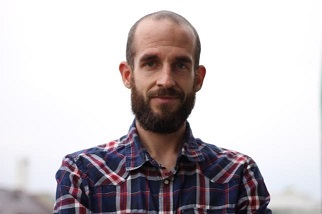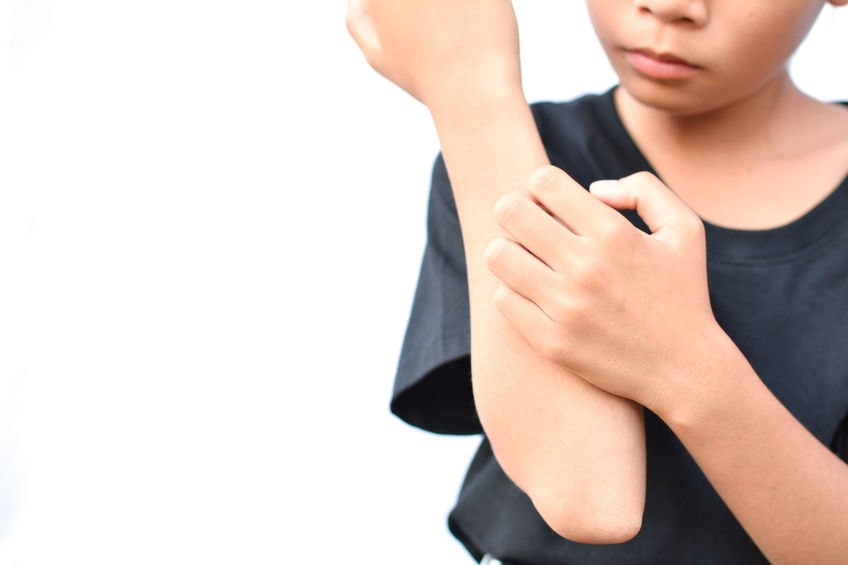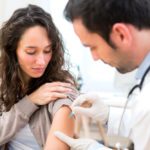Suddenly, you notice that your child’s skin is covered with small, red, drop-shaped dots. Could these be symptoms of guttate psoriasis, a special form of psoriasis that typically occurs in children and adolescents?
Psoriasis in childhood is a heavy burden for the whole family. Not only does the child affected suffer from the symptoms and effects of psoriasis, but all family members. Dealing with the disease, knowing the symptoms, its course, and possible treatment methods helps to achieve the highest possible quality of life for the whole family.
What is psoriasis guttata?
Psoriasis guttata is a rather rare special form of psoriasis. It usually occurs suddenly, often in the course of an infectious disease and particularly affects children and young people between the ages of 5 and 15.
Psoriasis guttata in childhood often represents the first manifestation of psoriasis vulgaris.
Around 30 percent of all psoriasis patients develop pathological skin changes for the first time before the age of 20.
Frequently, the first outbreak of psoriasis occurs in infancy. Between the second and the eighteenth year of life, the frequency of psoriasis diseases increases linearly according to medical experts.
Symptoms of psoriasis guttata
In guttate psoriasis, the skin is covered with small, red, scaly dots that resemble water drops in shape. The individual dots range from the size of a pin to the size of a centime coin.
Psoriasis guttata most often occurs suddenly. In many cases, it occurs one to two weeks after bacterial infection of the upper airways or after an infection caused by streptococci.
Commonly affected body parts are:
- The chest,
- Stomach,
- Back,
- Extremities and/or
- Scalp.
The face, elbows and knees are usually not affected.
How does psoriasis guttata progress?
The course of guttate psoriasis is unpredictable. It can disappear completely within a few weeks, often directly after or alongside the healing of the present infection.
In other cases, it develops into chronic, “more typical” psoriasis, such as psoriasis vulgaris.
What are the triggers of guttate psoriasis?
In many cases, guttate psoriasis is triggered by bacterial infection. The cause is often an infection of the upper airways or a disease caused by streptococci, for example
- Tonsillitis,
- Angina or
- Scarlet fever.
Various drugs are considered possible triggers. These include:
- Beta-blockers,
- Lithium,
- Chloroquine or
- Hydroxychloroquine.
What helps with psoriasis guttata?
Treatment of guttate psoriasis is usually the same as for psoriasis vulgaris. Doctors often primarily treat this special form of psoriasis in children locally, considering dithranol local therapy to be the treatment of choice.
Radiotherapy (using UVB rays or PUVA therapy) also shows good results in most cases of guttate psoriasis.
Systemic therapy with medication is only necessary in exceptional cases. In theory, internal treatment with medication is feasible, but there are not enough specific studies available.
Psoriasis guttata often occupies up to 40 percent of the body’s surface. The affected skin areas are treated with highly re-fattening substances, with the expectation of spontaneous regression.
After streptococcal infections, therapy with antibiotics is also advisable.
Guttate psoriasis: a case for the whole family
Psoriasis in childhood is more common than one might think. There is a lack of controlled, scientific studies evaluating the appropriate treatment of the disease. In most cases, however, local treatments achieve satisfactory results.
Guttate psoriasis often disappears just as suddenly as it came. In other cases, it is only a so-called initial manifestation and then remains in the form of a more “common” psoriasis, such as psoriasis vulgaris, for a lifetime.
The effects are often greatly underestimated. Those affected not only have to struggle with the external symptoms, but often also experience a deterioration in their quality of life. Particularly in cases involving affected children and their families, daily skincare routines are seen as time-consuming.
Does your child suffer from psoriasis guttata? What was the course of the disease? The exchange with other parents of affected children encourages and also offers tips and support.
Become a part of our Facebook group, we look forward to getting to know you!
Find all sources
Sources:
- Altmeyer: Psoriasis guttata. In: Die Online-Enzyklopädie der Dermatologie, Venerologie, Allergologie und Umweltmedizin. URL: http://www.enzyklopaedie-dermatologie.de/artikel?id=3349. (accessed on 08.03.2019.)
- Christopher et al.: Psoriasis – auf einen Blick. Thieme 2003. p. 31.
- Psoriasis Forschungs- und Behandlungs-Centrums Charité – Universitätsmedizin Berlin: Welche Formen der Psoriasis gibt es? Wie erkennt man sie? URL:http://psoriasis-charite.de/Was_ist_Psoriasis/krankheitsbild/formen-der-psoriasis.html. (accessed on 08.03.2019).
- Emmanuel Laffitte, Service de Dermatologie et Vénérologie, Centre Hospitalier
- Universitaire vaudois (CHUV), Lausanne: Psoriasis beim Kind. URL: http://www.swiss-paediatrics.org/sites/default/files/paediatrica/vol17/n6/pdf/28-31.pdf. (accessed on 08.03.2019).

Bernd is one of the founders of Simply Psoriasis. He has been suffering from psoriasis for more than 20 years, but sees the chronic skin disease with more composure than a few years ago (which was a hard work). Nevertheless, he is very keen to make psoriasis easier and more socially accepted.









Last Comments